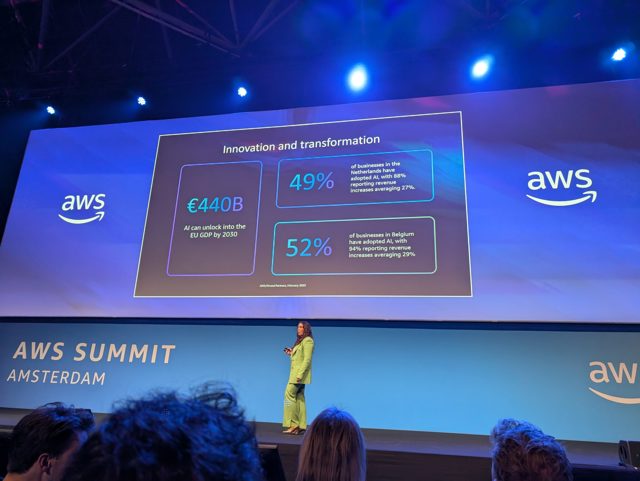< Back to news
Every year, millions of people worldwide suffer an ischemic stroke, the most common type of stroke. An ischemic stroke occurs when a blood clot blocks a blood vessel of the brain, causing a part of the brain to receive no or insufficient blood. Prompt treatment is crucial to prevent permanent disability or death.
Neurologist Jonathan Coutinho, Technical Physician Wouter Potters and professor of Radiology Henk Marquering, all from Amsterdam UMC, invented the brain-wave cap, which allows an EEG (brain wave test) to be carried out in the ambulance. This EEG shows whether there is an ischemic stroke and whether the blocked cerebral blood vessel is large or small. This distinction determines the treatment: in case of a small ischemic stroke, the patient receives a blood thinner, and in case of a large ischemic stroke, the blood clot must be removed mechanically in a specialized hospital. Thanks to AI, the cap can make the decision itself which it then proposes to the ambulance team who make the ultimate decision.
Between 2018 and 2022, the smart brain-wave cap was tested in twelve Dutch ambulances, with data collected from almost 400 patients. The study shows that the brain-wave cap can recognize patients with a large ischemic stroke with great accuracy. "This study shows that the brain-wave cap performs well in an ambulance setting. For example, with the measurements of the cap, we can distinguish between a large or small ischemic stroke," adds Coutinho.
In order to develop the brain-wave cap into a product and bring it to the market, TrianecT, an Amsterdam UMC, spin-off company was founded in 2022. In addition, a follow-up study (AI-STROKE) is currently ongoing in which even more measurements are collected in order to develop an algorithm for improved recognition of a large ischemic stroke in the ambulance. The Dutch Heart Foundation has also recognised the importance of this research and has made 4 million euros available for large-scale research into faster treatment of ischemic stroke. 


19 October 2023
Smart brain-wave cap recognizes stroke before the patient reaches the hospital
Amsterdam UMC designs brain-wave cap that is suitable for use in the ambulance.
A special brain-wave cap can diagnose stroke in the ambulance, allowing the patient to receive appropriate treatment faster. Jonathan Coutinho, neurologist at Amsterdam UMC, is one of the inventors the swimming cap: "Our research shows that the brain-wave cap can recognize patients with large ischemic stroke with great accuracy. This is very good news, because the cap can ultimately save lives by routing these patients directly to the right hospital." The research is published today in Neurology.
Every year, millions of people worldwide suffer an ischemic stroke, the most common type of stroke. An ischemic stroke occurs when a blood clot blocks a blood vessel of the brain, causing a part of the brain to receive no or insufficient blood. Prompt treatment is crucial to prevent permanent disability or death.
Neurologist Jonathan Coutinho, Technical Physician Wouter Potters and professor of Radiology Henk Marquering, all from Amsterdam UMC, invented the brain-wave cap, which allows an EEG (brain wave test) to be carried out in the ambulance. This EEG shows whether there is an ischemic stroke and whether the blocked cerebral blood vessel is large or small. This distinction determines the treatment: in case of a small ischemic stroke, the patient receives a blood thinner, and in case of a large ischemic stroke, the blood clot must be removed mechanically in a specialized hospital. Thanks to AI, the cap can make the decision itself which it then proposes to the ambulance team who make the ultimate decision.
"When it comes to stroke, time is literally brain. The sooner we start the right treatment, the better the outcome. If the diagnosis is already clear in the ambulance, the patient can be routed directly to the right hospital, which saves valuable time," says Coutinho.
Between 2018 and 2022, the smart brain-wave cap was tested in twelve Dutch ambulances, with data collected from almost 400 patients. The study shows that the brain-wave cap can recognize patients with a large ischemic stroke with great accuracy. "This study shows that the brain-wave cap performs well in an ambulance setting. For example, with the measurements of the cap, we can distinguish between a large or small ischemic stroke," adds Coutinho.
In order to develop the brain-wave cap into a product and bring it to the market, TrianecT, an Amsterdam UMC, spin-off company was founded in 2022. In addition, a follow-up study (AI-STROKE) is currently ongoing in which even more measurements are collected in order to develop an algorithm for improved recognition of a large ischemic stroke in the ambulance. The Dutch Heart Foundation has also recognised the importance of this research and has made 4 million euros available for large-scale research into faster treatment of ischemic stroke.
Vergelijkbaar >
Similar news items

April 16, 2025
AWS: Dutch businesses are adopting AI faster than the European average
New research from AWS shows that Dutch businesses are rapidly adopting AI—at a rate of one new implementation every four minutes, well ahead of the European average.
read more >

April 16, 2025
Submit your nomination for the Dutch Applied AI Award 2025
Do you know or develop an innovative AI application? Submit it now for the 2025 Dutch Applied AI Award, presented at the Computable Awards.
read more >

April 16, 2025
UK government tests AI to predict murders
The UK government is developing an AI system that could predict who is most likely to commit a serious crime. Critics call the project dangerous and discriminatory.
read more >